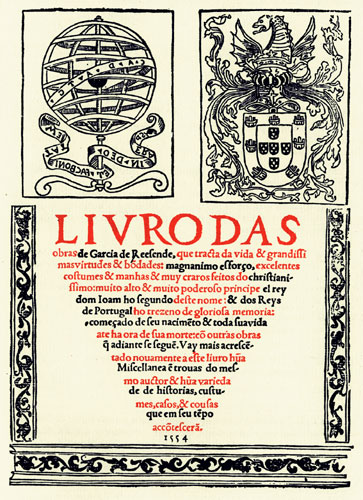Garcia De Resende on:
[Wikipedia]
[Google]
[Amazon]
Garcia de Resende (14703 February 1536) was a Portuguese poet and editor. He served John II as a page and private secretary. After John's death, he continued to enjoy the same favour with Manuel I, whom he accompanied to Castile in 1498, and from whom he obtained a 
knight
A knight is a person granted an honorary title of a knighthood by a head of state (including the pope) or representative for service to the monarch, the church, or the country, especially in a military capacity.
The concept of a knighthood ...
hood in the Order of Christ.
In 1514, Resende went to Rome
Rome (Italian language, Italian and , ) is the capital city and most populated (municipality) of Italy. It is also the administrative centre of the Lazio Regions of Italy, region and of the Metropolitan City of Rome. A special named with 2, ...
with Tristão da Cunha, as secretary and treasurer of the embassy sent by the king to offer tribute to Pope Leo X
Pope Leo X (; born Giovanni di Lorenzo de' Medici, 11 December 14751 December 1521) was head of the Catholic Church and ruler of the Papal States from 9 March 1513 to his death in December 1521.
Born into the prominent political and banking Med ...
. In 1516 he was given the rank of a nobleman of the royal household, and became ''escrivão de fazenda'' to Prince John, afterwards King John III, from whom he received further pensions in 1525.
Resende built a chapel
A chapel (from , a diminutive of ''cappa'', meaning "little cape") is a Christianity, Christian place of prayer and worship that is usually relatively small. The term has several meanings. First, smaller spaces inside a church that have their o ...
in the monastery
A monastery is a building or complex of buildings comprising the domestic quarters and workplaces of Monasticism, monastics, monks or nuns, whether living in Cenobitic monasticism, communities or alone (hermits). A monastery generally includes a ...
of Espinheiro near Évora
Évora ( , ), officially the Very Noble and Ever Loyal City of Évora (), is a city and a municipalities of Portugal, municipality in Portugal. It has 53,591 inhabitants (2021), in an area of . It is the historic capital of the Alentejo reg ...
, the pantheon of the Alentejo
Alentejo ( , , ) is a geographical, historical, and cultural region of south–central and southern Portugal. In Portuguese, its name means "beyond the Tagus" ().
Alentejo includes the regions of Alto Alentejo Province, Alto Alentejo and Bai ...
nobility
Nobility is a social class found in many societies that have an aristocracy. It is normally appointed by and ranked immediately below royalty. Nobility has often been an estate of the realm with many exclusive functions and characteristics. T ...
, where he was buried.

Poetry
He began to cultivate the making of verses in the palace of John II, and he reported that how one night when the king was in bed he caused him Resende to repeat some "trovas" (troubador songs) of Jorge Manrique, saying it was as needful for a man to know them as to know the '' Pater Noster''. Under these conditions, Resende grew as a poet, and moreover distinguished himself by his skill in drawing and music; while he collected into an album the best court verse of the time. This was the ''Cancioneiro Geral'' (General Songbook), probably starting in 1483, though not printed until 1516, which includes the compositions of some three hundred '' fidalgos'' of the reigns of kings Afonso V, John II, and Manuel I. The main subjects of its pieces are love,satire
Satire is a genre of the visual, literary, and performing arts, usually in the form of fiction and less frequently non-fiction, in which vices, follies, abuses, and shortcomings are held up to ridicule, often with the intent of exposin ...
and epigram
An epigram is a brief, interesting, memorable, sometimes surprising or satirical statement. The word derives from the Greek (, "inscription", from [], "to write on, to inscribe"). This literary device has been practiced for over two millennia ...
; and most of them are written in the national ''redondilha'' Verse (poetry), verse, but the Meter (poetry), metre is irregular and the rhyming
A rhyme is a repetition of similar sounds (usually the exact same phonemes) in the final stressed syllables and any following syllables of two or more words. Most often, this kind of rhyming (''perfect rhyming'') is consciously used for a musica ...
careless. The Spanish language is largely employed, because the literary progenitors of the whole collection were Juan de Mena, Jorge Manrique, Boscán and Garcilaso. As a rule the compositions were improvised at palace entertainments, at which the poets present divided into two bands, attacking and defending a given theme throughout successive evenings. At other times these poetical soirées took the form of a mock trial at law, in which Eleanor
Eleanor () is a feminine given name, originally from an Old French adaptation of the Old Provençal name ''Aliénor''. It was the name of a number of women of royalty and nobility in western Europe during the High Middle Ages">Provençal dialect ...
, the queen of John II, acted as judge. Resende was mocked by other rhymesters about his corpulence, but he repaid all their gibes with interest.
The linguist Edgar Prestage gives an assessment of the ''Cancioneiro Geral'' in the ''Encyclopædia Britannica'' Eleventh Edition.
References
{{DEFAULTSORT:Resende 1470 births 1536 deaths 15th-century Portuguese poets 16th-century Portuguese poets Portuguese male poets Portuguese Renaissance writers 16th-century Portuguese male writers People from Évora